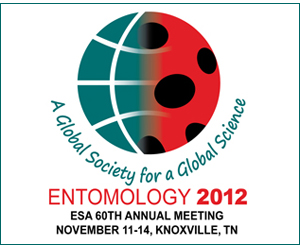North Central Branch Annual Meeting Online Program
Evaluation of foliar-applied insecticides to control leaf-feeding insect pests of soybean
Monday, June 4, 2012
Regents C (Embassy Suites)
Soybean fields host many leaf-feeding insects, including some that can cause major damage to the crop if not controlled with an effective integrated pest management approach. A problem arises with the great diversity in types of insect present, and their occurrence throughout the growing season. A common management practice consists of applying insecticides as a chemical control method to keep insect densities below economically damaging levels. Foliar applications are the most effective way to apply the insecticides when targeting leaf-feeding insects. A field experiment was designed to test the efficacy of several different foliar-applied insecticides, including: Cobalt, Leverage 360, Mustang Max, Nufos 4E, Sevin XLR Plus, and Warrior II. Densities of common leaf-feeding insects (bean leaf beetles, grasshoppers, and Japanese beetles) were assessed once a week for three weeks after the application of insecticides to evaluate the efficacy of each insecticide. Samples were collected using sweep nets with 20 sweeps per plot. Pest densities were assessed at 0, 7, 14, and 21 days after treatment. Although densities of some pests were low, significant differences were observed during the experiment. Additionally, yield data was collected. Results with regard to pest density, insecticide efficacy, and yield data will be discussed.


